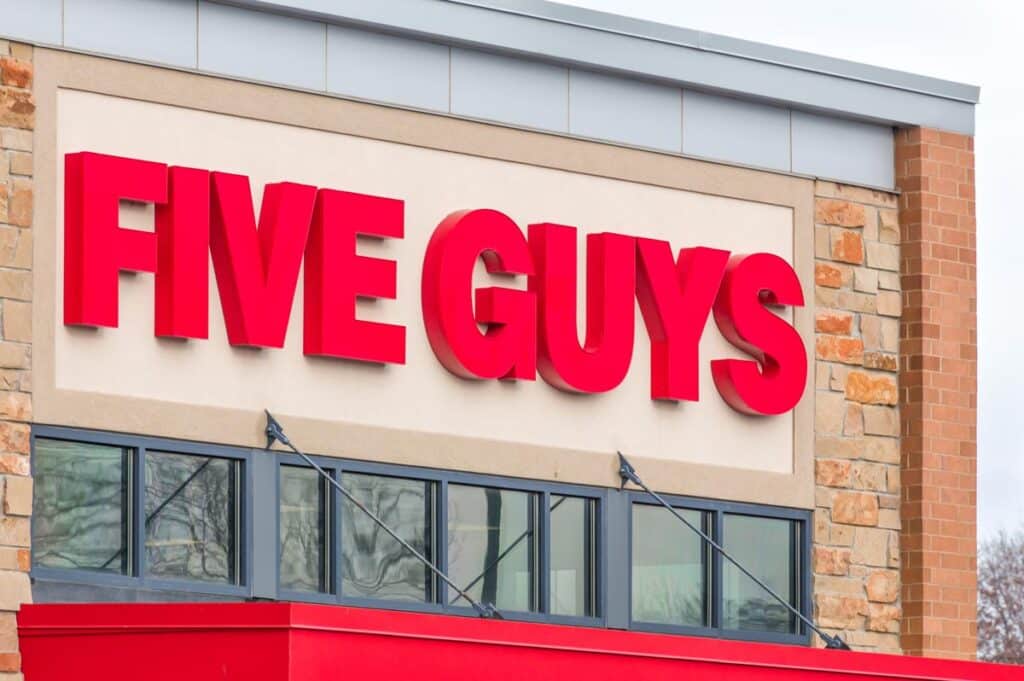
Update:
- A California federal judge has been asked to give final approval to a $1.2 million class action settlement between Five Guys and Encore FGBF that resolves workers’ claims of alleged California labor law violations.
- On April 19, the workers filed a brief urging U.S. District Judge Jennifer Thurston to give the deal the green light after the deal had been sent back to the drawing board four previous times thanks to the judge’s questions over its adequacy for workers.
- The deal would resolve claims that the company denied workers breaks and overtime pay.
- The lawsuit claimed the company did not provide 2,206 non-exempt employees with meal breaks or rest breaks in accordance with California labor law.
(Oct. 27, 2020)
A $1.2 million Five Guys and Encore FGBF class action settlement resolving workers’ claims of alleged California labor law violations has been stalled, based on a California federal judge’s findings that the description of the settlement agreement in the motion briefing was not the same as the actual proposed settlement terms.
Plaintiff Jeremy L. filed a motion for preliminary approval of the new proposed settlement terms in the United States District Court for the Eastern District of California, where the case is being heard. The new proposed terms would give each class member nearly $50 more than the terms the court previously rejected, and the attorney fees were reduced.
However, the actual new settlement terms submitted to the court did not reflect the increase in the amount awarded to each class member. Although the new terms were included in the motion briefing description, the proposed settlement and actual proposed class notice submitted to the court did not match — they included the same terms as the previously denied settlement.
In his Oct. 17, 2020, order denying preliminary approval of the settlement, U.S. Senior District Judge Anthony Ishii stated the court could not conclude the “proposed settlement agreement is fair, reasonable, and adequate” because it didn’t match what were the actual settlement terms. The judge also noted a discrepancy in the class definition in both the actual proposed settlement agreement and the motion briefing.
“It appears to the Court that in Plaintiff’s second motion for preliminary approval, Plaintiff simply reused the copies of the proposed settlement agreement and the proposed class notice that Plaintiff presented to the Court in the first motion for preliminary approval — even though the Court explicitly rejected certain terms in the first proposed settlement agreement and first proposed class notice, such as the attorney’s fees award,” Judge Ishii said in his order.
What were the wage and hour violations alleged in the Five Guys class action lawsuit?
According to the allegations in the lawsuit, the plaintiff worked at a Five Guys location in California from August to November 2016 as a “manager-in-training.” He claimed he and a class of 2,206 non-exempt employees were not provided with meal breaks or rest breaks in accordance with California labor law.
The plaintiff also claimed he and the class members were forced to work off the clock and were not provided with the minimum wage or overtime wage required by law. Additionally, the suit alleged Five Guys violated California labor law by failing to reimburse for gas and mileage, failing to provide wage statements and failing to provide timely payment of final wages.
The plaintiff further contended in the suit that the restaurant violated the Fair Credit Reporting Act (FCRA) by conducting background checks and procuring credit reports to evaluate potential employees without disclosure.
The proposed class action settlement
Following mediation, Five Guys and Encore FGBF agreed to a settlement in October 2018 to resolve the allegations of the wage-and-hour violations. Judge Ishii rejected the settlement in December 2019 for the first time, concluding the plaintiff wasn’t able to show that the proposed settlement agreement provided adequate relief or that enough discovery was conducted before entering the settlement agreement.
The court also found that the proposed attorneys’ fees of $400,000 in the first proposed class action settlement were beyond the Ninth Circuit’s benchmark of 25%, instead making up one-third of the settlement amount. The court also cited the proposed settlement’s failure to address other claims raised in the lawsuit.
Jeremy moved for preliminary approval of the settlement agreement a second time in May 2020. The settlement was again denied with the court noting that the first settlement presented to the court was “simply reused,” after it was rejected.
According to the motion briefing filed by Jeremy for preliminary approval of the settlement, the class action settlement would total approximately $760,000, with each class member receiving an average of $344.51, and $300,000 awarded in attorneys’ fees. However, the proposed settlement agreement terms indicated that the class payment would not equal more than $600,000 with $299.18 being paid to each Class Member. Additionally, the proposed settlement agreement stated that attorneys’ fees could equal $420,000, while the proposed class notice said the fees would be $400,000.
“If Plaintiff again moves the Court for preliminary approval of a settlement agreement and proposed class notice, then Plaintiff is expected to provide the Court with copies of a proposed settlement agreement and proposed class notice that actually support [and] mirror the motion’s description of the settlement agreement and class notice,” the judge remarked in his order.
California wage & hour laws
California has strict laws to protect workers from unfair wage and hour practices by employers. Under California Labor Law, non-exempt workers are entitled to receive overtime pay of one-half times their regular pay rate for more than 40 hours worked a week. Workers must also be paid the minimum wage under state law.
In California, the current minimum wage is $12 per hour for employers with 25 employees or less and $13 per hour if there are 26 employees or more.
Employers are also required to provide their employees with meal and rest breaks in accordance with the law, as well as timely provide final pay upon termination of employment.
The Five Guys wage-and-hour lawsuit is Jeremy L., et al. v. Five Guys Enterprises LLC, Case No. 1:17-cv-00762, in the United States District Court for the Eastern District of California.
Don’t Miss Out!
Check out our list of Class Action Lawsuits and Class Action Settlements you may qualify to join!
Read About More Class Action Lawsuits & Class Action Settlements:
- Bank of America lawsuit claims worker punished following equal employment opportunity charge
- Jewel-Osco data breach potentially affects thousands of employees
- UPS class action claims company does not pay reservists for short-term leave
- Tesla to pay $3.2M to former worker who endured racially hostile work environment














